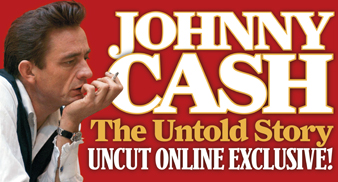In last month’s issue of Uncut , we brought you the inside story on the House Of Johny Cash. We spoke to his family, friends and collaborators to tell the definitive story of the Man In Black. Over the next few weeks on www.uncut.co.uk, we’ll be printing the complete transcripts of these interviews.
And here’s the fourth transcript from the feature: KRIS KRISTOFFERSON
Close friend, fellow Highwayman and singer-songwriter inspired to move to Nashville by Cash in the ‘60s. Achieved success after appearing on Cash’s TV show.
For previous interviews with Rodney Crowell and Nick Cave and Johnny’s son John Carter Cash. Click on the links in the side panel on the right.
***
UNCUT: How did you meet Johnny Cash?
KRISTOFFERSON: I grew up listening to Hank Williams and Johnny Cash, so arriving in Nashville in the ‘60s was really exciting for me. I’d just come out of five years in the army, so it represented everything I really wanted to do. Country music was still looked down upon back then. It didn’t have the respect that it came to have. When I was stationed in Germany, Johnny Cash was already a legend over there because he’d done some shows, then gone off to some bar straight afterwards and played just for the troops. So he was a real hero.
I’d quit Westpoint after a two-week leave in Nashville. And that’s when I met Cash, so it was the final nail in the coffin of my army career. I was backstage at the Ryman Auditorium, where they had the Grand Ole Opry, and he was prowling around like a panther. He was just the most exciting-looking person I’d ever seen. He was always larger than life, he never changed. [Songwriter and publisher] Marijohn Wilkin introduced me to him and I was hooked. I figured that if I couldn’t make it as a songwriter, then I could write about people like that. Just hangin’ out in that atmosphere. There were a lot of exciting people out there in Nashville. It was very liberating. I met a lot of young songwriters who were trying to make it there, but the older, established guys – people like Johnny Cash – were very supportive. Even if I didn’t make it as a songwriter, there were so many interesting people I could write about. It was kinda like Paris in the ’20s.
Didn’t you gate-crash Cash’s house in a helicopter, demos in hand, in the late ‘60s?
I suppose the helicopter thing was a little desperate, but you have to realise that I’d known John for a while anyway. I was his janitor at Columbia Records for nearly two years, where I’d try and pass him every song I ever wrote. I used to give [Cash guitarist] Luther Perkins or June Carter my tapes, so I wouldn’t get fired. He never cut any of ‘em, though. In fact, he told me later that he threw them in the lake! But he was very encouraging to me. I know he carried the lyrics to “The Golden Idol” around in his wallet. He never recorded that one, though. For me, it was enough to feel like I was makin’ it.
I still think I was lucky he didn’t shoot me that day! I’d briefly joined the National Guard, just trying to make some extra money. So I had a helicopter I was able to fly at the weekend. The story about me getting off the helicopter with a tape in one hand and a beer in the other isn’t true. Y’know, John had a very creative imagination. I’ve never flown with a beer in my life. Believe me, you need two hands to fly those things.
I would never have quit, I would have just hung around and been unsuccessful. But definitely, when John put me on the Newport Folk Festival, it started a whole performing career I just didn’t anticipate. I was tickled to death that people were just starting to cut my songs. And that was also down to him. He had a really radical TV show – full of people like Dylan, James Taylor, Joni Mitchell, people who never came to Nashville – and he’d tell everybody in town that Blueberry [Mickey Newbury] and I were the best songwriters around. We’d all get together regularly at John’s house and there’d be a big circle with people passing a guitar around. I remember Graham Nash there with Joni Mitchell and nobody knew who he was. We thought he was just Joni’s boyfriend.
Then he picked up the guitar and sang “Marrakesh Express”. Knocked everybody out. To be endorsed by someone like Cash was really something, like being endorsed by Dylan. I watched Dylan record Blonde On Blonde in my first week at work at CBS. It was just incredible. I think because of his respect for Johnny Cash, he recorded in Nashville and gave country a legitimacy to a whole new audience of people who’d always thought it was just hillbilly music.
When we all got together for Highwayman [1985’s Cash, Kristofferson, Willie Nelson and Waylon Jennings album], it was incredible. I loved it, but I just wish now that I’d realised how short it was going to be. It’s like life in that respect. It was such a blessing because every guy up there was my hero. I got to stand next to Johnny Cash and sing harmony every night. Now Willie and I are the only ones left. I wish I’d appreciated it more.
INTERVIIEW: ROB HUGHES


